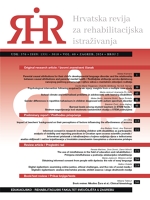Obtaining informed consent from people with dyslexia: the role of easy language
Obtaining informed consent from people with dyslexia: the role of easy language
Author(s): Marija Jozipović, Mirjana LenčekSubject(s): Language acquisition, Psycholinguistics, Sociolinguistics
Published by: Sveučilište u Zagrebu, Edukacijsko-rehabilitacijski fakultet
Keywords: Informed consent; dyslexia; easy language; language adaptation; graphic adjustments;
Summary/Abstract: Obtaining informed consent is a standard procedure in research practice. However, it is not sufficient, even if an individual chooses to participate voluntarily in research process, for the researchers to be able to claim that they have obtained informed consent. The consent must be of sufficiently ‘high quality’: it must not only be informed, but also valid, i.e., it must contain the following three elements: adequate information, voluntariness, and competence. Although preparing informed consent is a difficult process in general, it is particularly challenging when working with certain populations, such as clinical groups who have language and literacy difficulties, e.g., dyslexia. A lack of understanding of the basis and specific characteristics of this disorder can have negative effects on people with dyslexia (PwD) such as in the form of unwanted misunderstandings, psychological stress, negative effects on their learning processes, as well as unethical treatment in the research process. Studies have shown that PwD can be particularly vulnerable to research that might exploit, imply, or attribute unsafe practices to them and their difficulties, especially in connection with research recommendations that require written informed consent. Easy language refers to the language adaptation of a text to facilitate both reading and comprehension, particularly for PwD. Therefore, the use of the easy language guidelines for language adaptation and graphical adjustment is important when obtaining informed consent from PwD.
Journal: Hrvatska revija za rehabilitacijska istraživanja
- Issue Year: 60/2024
- Issue No: 2
- Page Range: 204-218
- Page Count: 15
- Language: English

